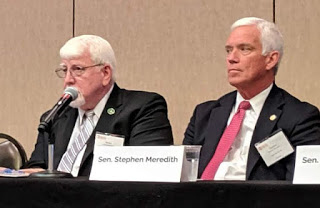Legislature heads home after passing rural-hospital bill with provision senators say lets Beshear buy all anti-virus gear needed

Rep. Danny Bentley, Sen. Stephen Meredith (Melissa Patrick photo)
—–
Kentucky Health News
In its waning hours Wednesday, the General Assembly passed a bill to help rural hospitals, but without specific funding, and added to it language that the Senate president said would give Gov. Andy Beshear the authority he needs to buy protective gear for health-care workers fighting the covid-19 pandemic.
Beshear speaks daily at his covid-19 press briefing about the challenges of securing personal protective equipment for health-care workers. Tuesday he said the shortage of PPE makes it impossible for him to relax his emergency order against elective procedures, which is hurting hospitals.
The governor vetoed a section of the budget bill prohibiting him from spending any unbudgeted funds without legislative approval, saying it would prevent him from adjusting to changing circumstances.
The legislature overrode the veto, but added language to House Bill 387 that Sen, Chris McDaniel, R-Union, said makes it “very, very clear that any amount of unbudgeted, restricted funds could be used for the purchase of PPE in evaluating and treating covid-19 patients during the declared state of emergency.”
McDaniel, chair of the Senate budget committee, said he thought the bill “adequately defined this, but this is definitely a belt-and-suspenders type of approach before we head home tonight.”
Senate President Robert Stivers said the bill also gives Beshear “access to undesignated restricted funds, which is extensive and huge flexibility that I have never seen in 24 years given to a governor.”
The underlying bill, sponsored by Rep. Danny Bentley, R-Russell, will create a revolving loan fund for financially distressed rural hospitals — though it’s not yet funded.
It allows the Cabinet for Economic Development to provide loans to struggling hospitals for three purposes: to maintain or upgrade their facilities; to maintain or increase staff; or to provide health-care services not currently available. The loans could run 20 years and would be available to hospitals in counties with fewer than 50,000 people.
Bentley told the House that there are 64 such counties in Kentucky, and “This’ll give an instrument where we’ll keep ’em going someday.”
Sen. Stephen Meredith, R-Leitchfield, reminded the Senate that the genesis of this bill was a reaction to the General Assembly providing $35 million loan to the University of Louisville to help it buy Jewish Hospital and other facilities that were at risk of closing.
“I certainly support this bill, but the concern I have is the perception that it may resolve the issues and it will not,” said Meredith, a former hospital administrator. “At the very best, what this bill is going to do is place a piece of duct tape on a sinking ship. If we don’t address the fundamental problems that put rural hospitals in this position to begin with, we are going to make a very poor investment in the future.”
He added that while a much-needed task force has been proposed to help small businesses recover from the covid-19 pandemic, he suggested that one is also needed to help rural hospitals recover because they are one of the largest contributors to rural economies.
He predicted, “Because of what has happened as a result of covid-19, we are going to lose some rural hospitals.”
Sen. Robin Webb, D-Grayson, talked about what the coming loss of Our Lady of Bellefonte Hospital in Greenup County means to that community, including the loss of thousands of jobs and tax revenue, and the loss of providers whom she said “have scattered like buckshot.”
She called the bill a “regional, bipartisan effort” that started before the pandemic, which she said now puts us in a “very precarious situation.”
“This is a start,” she said. “And this is to raise awareness of the issue.”
A Navigant Consulting Inc. study published in October concluded that 16 of Kentucky’s rural hospitals, or about one-fourth of the total, are at high risk of closing unless their finances improve. Another study at the University of North Carolina said eight rural Kentucky hospitals are at high risk of financial distress and 23 more are considered to have mid-high risk.
The Kentucky Hospital Association, using 2017-18 data, concluded that 35 of the 70 hospitals it considers to be rural are in poor financial health, with 14 of them “very vulnerable.” The numbers vary because the studies measure financial distress differently.
Five rural Kentucky hospitals have closed since 2009, four of them since 2014, according to a UNC report.